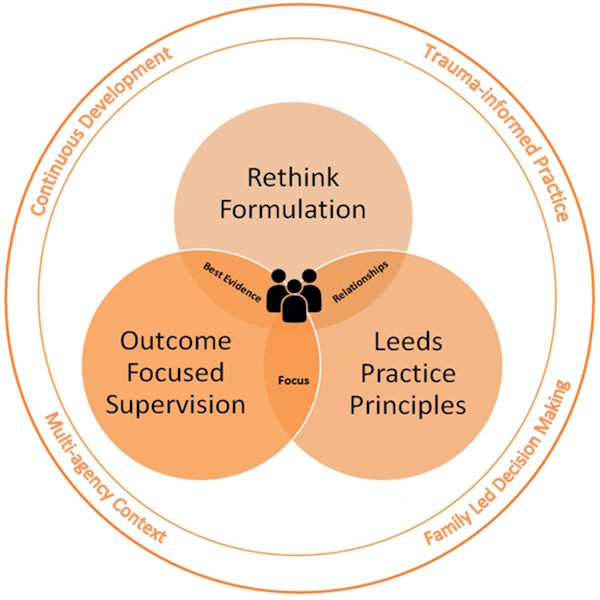What is Leeds practice model
The Leeds Practice Model integrates and structures evidence-based approaches and principles into a framework that guides and supports practice. It should permeate the culture, thinking and practice within all services for Children and Families in Leeds to enable the best possible, sustainable outcomes. The Rethink Team support implementation of the Leeds Practice Model across services in Leeds through a variety of practice development activities.
The model provides a clear framework and expectations for the entire children and families workforce, bringing together strengths-based, family-led, trauma-informed and restorative practice activities, values and approaches.
The Leeds Practice Model promotes an approach that: is restorative and relational (with families and between colleagues); emphasises curiosity and seeks to understand; is strengths-focused; is child-centred and family-led; is trauma-informed; involves effective multi-agency working; places focus on practice and learning; and creates greater accountability.
The Leeds Practice Model is adaptable and flexible - focusing on principles and approaches which allow workers to utilise and apply their individual skills, knowledge and experience rather than imposing fixed ways of working. It has seven elements that are all complementary and necessary to each other, as expressed in the image and text:

Seven elements of the Leeds practice model
Multi-agency working
A thorough and integrated practice approach that utilises all means, agencies and colleagues available to us when working with families and each other.
Continuous development
Practitioners, managers and supervisors utilise evidence-based approaches and 'best practice' to create and maintain effective and up to date development for all.
Trauma-informed practice
A truly compassionate, sensitive and empathic approach to our work which is grounded in the recognition and understanding that trauma can have a wide and lasting impact on an individuals development, including on their ability to feel safe or develop trusting relationships with others. It acknowledges the need to see beyond an individual's presenting behaviours and to ask, 'What has happened to this person and what do they need?' rather than 'What is wrong with this person?'.
Family-led practice
Shifting the balance of power from professional-led practice towards children and their families by identifying opportunities to maximise the involvement of families in decisions, plans and interventions. A strength-focused, systemic way of working that empowers families and leads to sustainable change.
Rethink formulation process
Often referred to as the '6Ps', the Rethink formulation process offers a unified approach to help us to make sense of things; develop a shared language; analyse deeper; bring together multiple perspectives; and develop evidence-based plans.
Leeds practice principles
10 restorative and relational principles that define how we should go about our work with families and with each other:
- always working with
- relationship based
- enabling the utility of the family
- early in the life of a problem
- one family, one lead worker, one plan
- systemic, formulation driven and evidenced-based
- transparent
- strength focussed
- recognising engagement with education as a protective factor
- accountability, evaluation and sustainability
Outcome-focused supervision
An approach to supervision which holds agreed outcomes in mind at all times. There is a focus on professional accountability for plans and a thorough exploration and checks of the rationale and thinking behind each plan. Outcome focused supervision provides an opportunity for reflection and joint assessment of advances and barriers to help us keep on track with what we are trying to achieve and how we are trying to achieve it.
Key contacts and more information
More information about the Practice Model and the work of the Rethink Team is available at Leeds Practice Model and Rethink (for Leeds City Council Children and Families staff). For enquiries and to be added to the Rethink mailing list contact rethink.team@leeds.gov.uk.
Printable version
